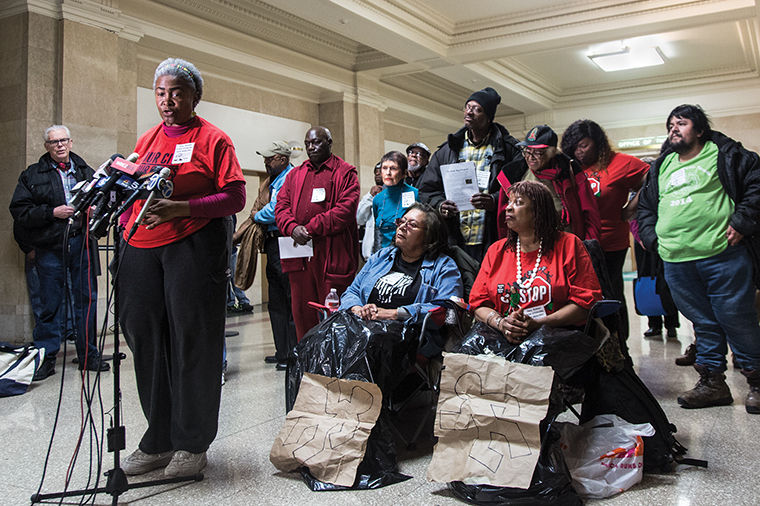Mental health advocates demand restoration of city clinics
Mental Health Movement activists demanded Mayor Emanuel reopen six shuttered mental health clinics at a Feb. 23 City Hall demonstration.
February 29, 2016
Activists with the Mental Health Movement coalition held a demonstration outside Mayor Rahm Emanuel’s office the morning of Feb. 23 demanding the reopening of the city’s six shuttered mental health clinics and the creation of a 24-hour mental health hotline.
Activists filled black body bags with written testimonies of people who say they have been impacted by the city’s declining public mental health safety net.
“We chose to use black body bags because people feel the Mayor has trashed our lives,” said N’Dana Carter, a mental health activist and organizer. “This is not a regular body bag, but a garbage bag, something that is disposable, as [Emanuel] seems to think we are.”
Mayor Emanuel announced Jan. 29 a plan to train Chicago Police Department officers and supervisors about mental health and how to de-escalate tense situations.
Alexa James, executive director of the National Alliance on Mental Illness-Chicago, said the announcement was an important step toward changing police interactions with residents.
“The mental health system in our city-state is bare bones and we don’t have enough funding to adequately provide treatment for everyone,” James said. “We know the training alone is not going to cure the issues in the community.”
Aldermen, union leaders and community members have rallied behind the proposed Mental Health Safety Net ordinance introduced to the City Council Feb. 3.
The ordinance calls on the city to make mental health resources, including the city’s six shuttered public mental health clinics, more accessible to the public.
Carter said the coalition is working to ensure public funding does not go to private providers.
In a Feb. 24 emailed statement, Dr. Julie Morita, commissioner of the Chicago Department of Public Health, said the city has made “significant improvements” to the mental health safety net.
“The City of Chicago remains committed to ensuring our most vulnerable residents have access to quality mental health services,” Morita said in the email.
The Rev. Jean Darling, from the Peoples Church of Chicago, led the group of protesters in prayer, and read a statement questioning the mayor’s priorities.
“The Mayor fixes potholes of the city streets but does not make the rough way smooth for those who suffer from mental illness,” Darling said. “Thousands of people were left to find their own solutions and, instead of getting care, they found their way to overwhelmed relatives, hospital emergency rooms, [jail] cells—or to the morgue.”
Veronica Morris-Moore, an activist with Fearless Leading by the Youth, whose activism led to the creation of a trauma center at the University of Chicago, said the mayor’s administration has implemented “anti-black” policies.
“What we are experiencing in this country is anti-blackness,” Morris-Moore said.
Governments and public officials are continuing a history of racism and genocide, she said.
Darrius Lightfoot, co-founder of FLY, said young people in his community have “traumatic wounds” stemming from witnessing violence. Lightfoot said he wants the mayor to reopen public clinics.
“We need health care in order to survive. There is no timeline on justice,” Lightfoot said. “Rahm Emanuel, we are at your door and this fight will continue.”








